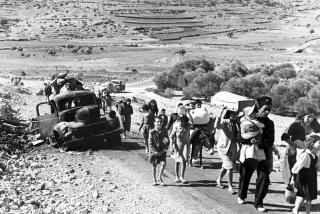Arafat Calls on Israel to Return to Peace Talks
- Share via
RAMALLAH, West Bank — Ten years after the signing of the historic Oslo peace accords whose goals were never achieved, Yasser Arafat said Saturday that the Israeli-Palestinian conflict is at its most difficult point since then and urged Israel to return to negotiations despite its threat to exile him.
Supporters filled the compound of the Palestinian Authority president Saturday to rally around their leader. They included more than 2,000 schoolchildren, accompanied by thousands of adults. Some pledged to act as human shields to defend Arafat from Israeli troops.
“Why do they interfere in our affairs and want to expel our leader? It will only happen over our dead bodies,” said Adnan Awad, camping outside Arafat’s office.
The Palestinian leader emerged from his partially destroyed compound to greet the crowd -- beaming, blowing kisses and flashing “V” for victory signs.
Israel blames Arafat for the collapse of peace efforts and says he has failed to stop terrorist attacks. After two suicide bombings killed 15 people last week, Prime Minister Ariel Sharon’s security Cabinet decided in principle to “remove” him.
The vaguely worded decision seems to leave open the options of exiling, killing or arresting Arafat. It stands in stark contrast to the signing of the Oslo accords on Sept. 13, 1993, when Arafat shook hands with then-Israeli Prime Minister Yitzhak Rabin on the White House lawn as President Clinton watched.
“At this moment, we are really facing the most difficult moment that we have faced since the signing of Oslo in 1993,” Arafat told foreign diplomats visiting his headquarters. “The problem is not just my problem and the threats that Israel has made to eliminate or to remove me. The problem, the real danger is the intent of the Israeli government to cancel the Palestinian partner.”
Speaking directly to Israel, he said, “Come to peace, come to make peace together.”
But Raanan Gissin, a senior aide to Sharon, said Arafat had not delivered on years of pledges.
“We want to remove this obstacle to peace ... to renew the process of reconciliation between the two peoples,” Gissin said. “As long as Arafat is around, that process is dead.”
In his speech to the dozen diplomats, Arafat urged pressure on Israel to end its killings of militant leaders and stop settlement construction in the West Bank and Gaza Strip.
The Oslo accords included mutual recognition between Israel and Arafat’s Palestine Liberation Organization, and allowed for the creation of a Palestinian government in the West Bank and Gaza. Tough issues -- the fate of Jerusalem, Jewish settlements, Palestinian refugees -- were left for “final status” talks.
In 1996, Arafat was elected to lead a Palestinian Authority that ultimately ruled over two-thirds of Gaza and almost half the West Bank.
More to Read
Sign up for Essential California
The most important California stories and recommendations in your inbox every morning.
You may occasionally receive promotional content from the Los Angeles Times.










